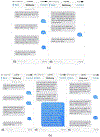Investigating the Role of Context in the Delivery of Text Messages for Supporting Psychological Wellbeing
- PMID: 37223844
- PMCID: PMC10201989
- DOI: 10.1145/3544548.3580774
Investigating the Role of Context in the Delivery of Text Messages for Supporting Psychological Wellbeing
Abstract
Without a nuanced understanding of users' perspectives and contexts, text messaging tools for supporting psychological wellbeing risk delivering interventions that are mismatched to users' dynamic needs. We investigated the contextual factors that influence young adults' day-to-day experiences when interacting with such tools. Through interviews and focus group discussions with 36 participants, we identified that people's daily schedules and affective states were dominant factors that shape their messaging preferences. We developed two messaging dialogues centered around these factors, which we deployed to 42 participants to test and extend our initial understanding of users' needs. Across both studies, participants provided diverse opinions of how they could be best supported by messages, particularly around when to engage users in more passive versus active ways. They also proposed ways of adjusting message length and content during periods of low mood. Our findings provide design implications and opportunities for context-aware mental health management systems.
Keywords: JITAI; contextual factors; daily schedule; energy; mental wellbeing; mood; text messages.
Figures



Similar articles
-
Pilot study of psychotherapeutic text messaging for depression.J Telemed Telecare. 2017 Aug;23(7):665-672. doi: 10.1177/1357633X16659955. Epub 2016 Jul 21. J Telemed Telecare. 2017. PMID: 27450571 Clinical Trial.
-
Development and Local Contextualization of Mobile Health Messages for Enhancing Disease Management Among Community-Dwelling Stroke Patients in Rural China: Multimethod Study.JMIR Mhealth Uhealth. 2019 Dec 17;7(12):e15758. doi: 10.2196/15758. JMIR Mhealth Uhealth. 2019. PMID: 31845901 Free PMC article. Clinical Trial.
-
Understanding messaging preferences to inform development of mobile goal-directed behavioral interventions.J Med Internet Res. 2014 Feb 5;16(2):e14. doi: 10.2196/jmir.2945. J Med Internet Res. 2014. PMID: 24500775 Free PMC article.
-
Self-directed self-management interventions to prevent or address distress in young people with long-term physical conditions: A rapid review.Health Expect. 2023 Dec;26(6):2164-2190. doi: 10.1111/hex.13845. Epub 2023 Aug 21. Health Expect. 2023. PMID: 37533152 Free PMC article. Review.
-
Service users experience of psychological interventions in primary care settings: A qualitative meta-synthesis.Clin Psychol Psychother. 2022 Mar;29(2):400-423. doi: 10.1002/cpp.2650. Epub 2021 Aug 2. Clin Psychol Psychother. 2022. PMID: 34260121 Review.
Cited by
-
From formative design to service-ready therapeutic: A pragmatic approach to designing digital mental health interventions across domains.Internet Interv. 2023 Sep 28;34:100677. doi: 10.1016/j.invent.2023.100677. eCollection 2023 Dec. Internet Interv. 2023. PMID: 37808416 Free PMC article.
-
Understanding the Role of Large Language Models in Personalizing and Scaffolding Strategies to Combat Academic Procrastination.Proc SIGCHI Conf Hum Factor Comput Syst. 2024 May;2024:15. doi: 10.1145/3613904.3642081. Epub 2024 May 11. Proc SIGCHI Conf Hum Factor Comput Syst. 2024. PMID: 38863598 Free PMC article.
-
Facilitators of and Barriers to Teachers' Engagement With Consumer Technologies for Stress Management: Qualitative Study.J Med Internet Res. 2024 Oct 22;26:e50457. doi: 10.2196/50457. J Med Internet Res. 2024. PMID: 39437381 Free PMC article.
-
A text messaging intervention to support the mental health of young adults: User engagement and feedback from a field trial of an intervention prototype.Internet Interv. 2023 Sep 9;34:100667. doi: 10.1016/j.invent.2023.100667. eCollection 2023 Dec. Internet Interv. 2023. PMID: 37746639 Free PMC article.
-
Using Adaptive Bandit Experiments to Increase and Investigate Engagement in Mental Health.Proc AAAI Conf Artif Intell. 2024 Mar 25;38(21):22906-22912. doi: 10.1609/aaai.v38i21.30328. Epub 2024 Mar 24. Proc AAAI Conf Artif Intell. 2024. PMID: 38666291 Free PMC article.
References
-
- Agyapong Vincent Israel Ouoku, Hrabok Marianne, Vuong Wesley, Shalaby Reham, Noble Jasmine Marie, Gusnowski April, Mrklas Kelly J, Li Daniel, Urichuk Liana, Snaterse Mark, et al. 2020. Changes in stress, anxiety, and depression levels of subscribers to a daily supportive text message program (Text4Hope) during the COVID-19 pandemic: cross-sectional survey study. ɈMIR Mental Health 7, 12 (2020), e22423. - PMC - PubMed
-
- Arps Emily R, Friesen Myron D, and Overall Nickola C. 2018. Promoting youth mental health via text-messages: a new zealand feasibility study. Applied Psychology: Health and Well-Being 10, 3 (2018), 457–480. - PubMed
-
- Baumer Eric PS. 2015. Reflective informatics: conceptual dimensions for designing technologies of reflection. In Proceedings of the 33rd Annual ACM Conference on Human Factors in Computing Systems. 585–594.
-
- Berrouiguet Sofan, Baca-García Enrique, Brandt Sara, Walter Michel, Courtet Philippe, et al. 2016. Fundamentals for future mobile-health (mHealth): a systematic review of mobile phone and web-based text messaging in mental health. Ɉournal of medical Internet research 18, 6 (2016), e5066. - PMC - PubMed
Grants and funding
LinkOut - more resources
Full Text Sources
